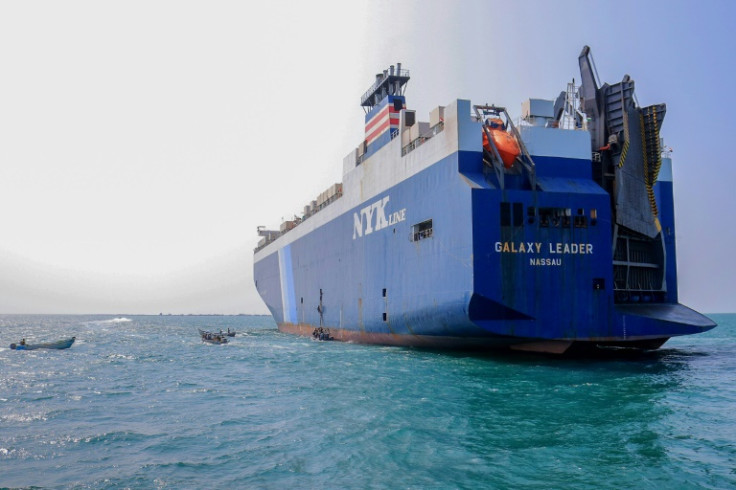
The Red Sea conflict is turning from a minor to a major geopolitical event, as supply chain disruptions could be a game-changer for global inflation.
"The conflict has led to attacks on vessels transiting the Red Sea, causing shipping companies to reroute, which has spiked freight rates," Steve Crews, an online marketing specialist, told International Business Times. "This rerouting, especially around the Cape of Good Hope, increases transportation costs and delays, affecting global trade."
"Companies are experiencing delivery hold-ups due to the conflict, and container rates have soared due to the crisis," he said, adding, "This exacerbates supply chain issues, contributing to inflationary pressures."
Indeed, the Containerized Freight Index has more than doubled since the beginning of October 2023, from 850 to 2,179 points. It increased 419 points or 24% since the beginning of 2024 alone. Historically, the Containerized Freight Index reached an all-time high of 5109.60 points in January 2022.
Crews believes that the Red Sea conflict could disrupt the global oil supply and cause prices to surge. "This is particularly worrying as oil prices directly influence inflation rates," he said.
However, oil prices have moved in the opposite direction, while soaring transportation costs have yet to change the game for the eurozone.
According to EUROSTAT, eurozone inflation dropped to an annual rate of 2.8% in January 2024 from 2.9% in December. The core rate, excluding volatile food and energy items from the consumer basket, continued to ease to 3.3%, above forecasts of 3.2%, but it has reached its lowest level since March 2022.
Thomas Samuelson, CIO at Vineyard Global Advisors, provides further evidence of the disconnect between soaring shipping costs and inflation.
"While the Red Sea accounts for 12% of global maritime trade and shipping costs have soared 350% due to the recent Houthi attacks on international shipping, market-based inflation indicators are not signaling a chronic resurgence in inflation because of the turmoil," he told IBT.
"Forward-looking inflation measures remain well anchored at 2.3% to 2.7% looking 1-3 years out, compared to spikes of over 6% in the wake of the Covid pandemic and Russian invasion of Ukraine in Feb 2021," Samuelson said.
He attributes this disconnect between soaring shipping costs and inflation to two factors. First, the shipping cost spike doesn't coincide with a factory shutdown or a surge in global demand, as was the tail-end of the Covid pandemic when goods inflation soared.
Second, international transportation costs account for a tiny share of the final consumption cost of goods, roughly 1.5% on average. "Sea freight accounts for even less at 0.7%," he said, adding, "A recent Goldman Sachs analysis found that a 100% increase in sea freight cost would only raise the overall core inflation rate by 0.1%."
Diana Zheng, Head of Marketing at Stallion Express, Canada's leading eCommerce shipping company, provides further insight into the Red Sea crisis and its potential impact on inflation.
"The Red Sea conflict has stirred the global economy. It has disrupted major trade routes, affected the movement of products, and potentially influenced inflation rates. However, it is important to emphasize that the impact of inflation is not as obvious as it may appear," she told IBT.
"While shipping disruptions might raise expenses, they do not always result in high inflation," Zheng said, adding, "The resilience of the global supply chain and sectors' ability to tolerate increasing costs are important considerations."
Matt Willer, Managing Director of Capital Markets and Partner at Phoenix Capital Group Holdings, LLC, sees the spike in transportation costs eventually affect consumer prices of the goods being rerouted. However, the impact on inflation depends on the duration of the conflict.
"If this is short-term, the impact is likely negligible and regional, " he told IBT. But if this is a protracted situation, the inflationary impact will be significant.







